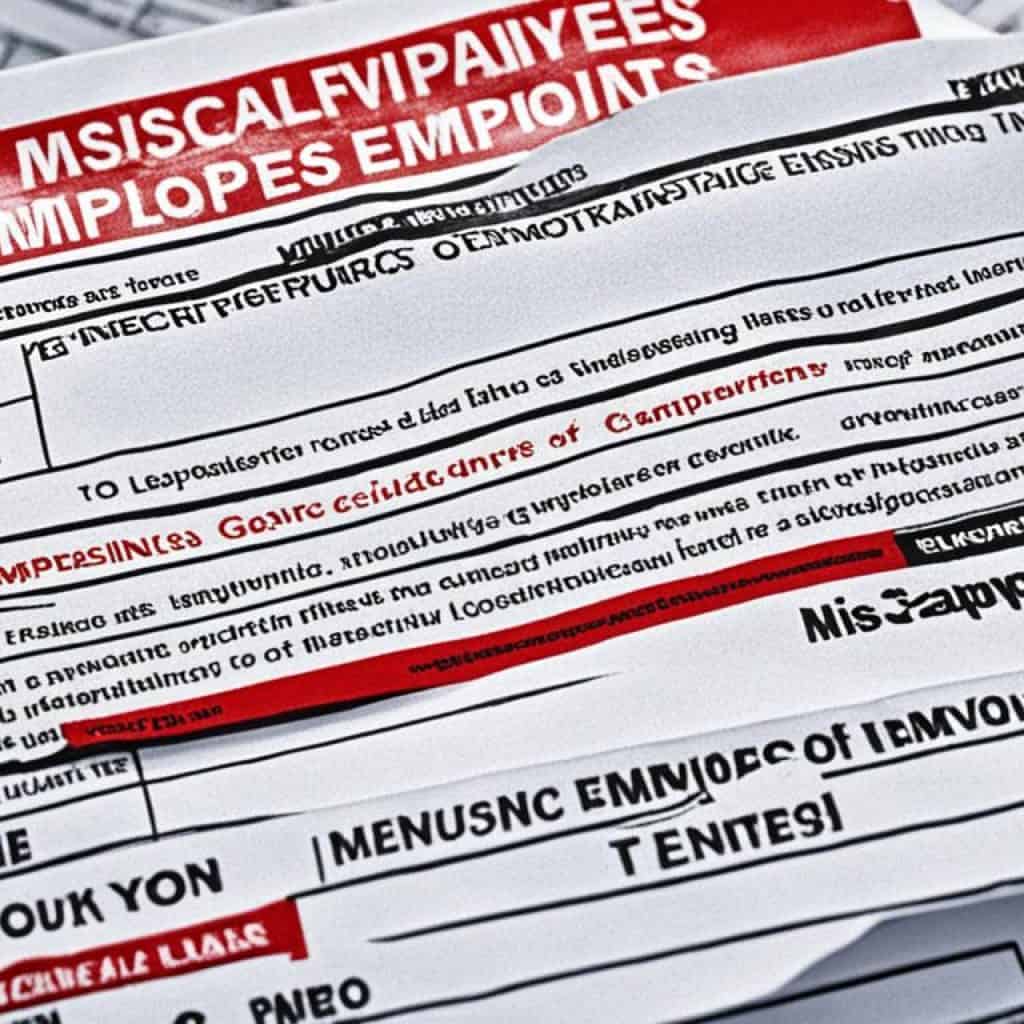Are you familiar with the labor laws in the Philippines? Do you know your rights and obligations as an employee or employer? The Labor Code of the Philippines is a comprehensive set of laws that govern employment in the country, encompassing various facets such as employment types, employee rights, termination, labor relations, and more. Understanding the key provisions of the Labor Code is crucial for ensuring compliance and protecting your rights in the workplace.
Key Takeaways:
- The Labor Code of the Philippines is a comprehensive set of laws that govern employment in the country.
- It covers aspects such as different types of employment, employee rights, termination, labor relations, social insurance, and more.
- Understanding the key provisions of the Labor Code is essential for both employees and employers to ensure compliance and protect their rights.
- Employees have the right to security of tenure and can only be dismissed for just or authorized causes.
- Misclassification of employees can lead to penalties for employers, including back pay, benefits reimbursement, fines, and potential jail time.
Types of Employment in the Philippines
Understanding the different types of employment in the Philippines is crucial for both employers and employees to navigate the labor landscape. The Labor Code of the Philippines recognizes six distinct categories of employment, each with its own characteristics and implications.
1. Regular Employment
Regular employment refers to full-time workers who provide necessary labor on an indefinite basis. These employees enjoy the most comprehensive set of labor protections and benefits, including social security, healthcare, and paid leaves. They are a vital part of the company’s workforce and have the expectation of continuing employment, subject to just cause termination.
2. Probationary Employment
Probationary employment allows employers to assess an employee’s suitability for a particular role during a trial period. Typically lasting around six months, this type of employment gives both parties a chance to evaluate job performance before committing to long-term employment. At the end of the probationary period, the employee may be hired as a regular employee or separated from the company.
3. Fixed-Term Employment
Fixed-term employment involves hiring an employee for a specific duration or until the completion of a particular project. This type of employment is common for jobs with a defined start and end date, such as construction projects or seasonal campaigns. Upon the expiration of the fixed term, the employment relationship automatically ends without the need for termination procedures.
4. Seasonal Employment
Seasonal employment primarily applies to agricultural workers who are employed during specific periods dictated by seasonal demands. These workers are hired to address the temporary increase in labor needs, such as the planting or harvesting seasons. Seasonal employees are entitled to labor rights and benefits as stipulated by law.
5. Project Employment
Project employment is characterized by hiring individuals for a specific project or task that is not within the regular course of business. This type of employment is common in industries such as event management, consulting, or software development. Project employees are engaged for the duration of the project and may not automatically transition into regular employment.
6. Casual Employment
Casual employment is initially characterized by its informal and non-committal nature, often arising from temporary staffing needs or irregular work schedules. However, casual employment can transition into regular employment after one year of continuous and uninterrupted engagement. During the transition, the employee becomes entitled to the benefits and protections of regular employment.
Understanding the nuances of each type of employment is essential for both employers and employees to ensure compliance with the Labor Code and safeguard their rights. By familiarizing themselves with these distinctions, stakeholders can establish mutually beneficial working arrangements and promote fair employment practices.
Right to Security of Tenure
The Labor Code of the Philippines enshrines the right to security of tenure for employees, ensuring that they can only be dismissed for just or authorized causes. This provision aims to protect employees from arbitrary termination and provide them with stability and job security.
Under the concept of just cause, employers must follow due process when considering an employee’s dismissal. This includes giving the employee proper notices, the opportunity to respond, and conducting a fair hearing to evaluate the circumstances. It ensures that the employee has a chance to present their side and defend themselves against any allegations.
Authorized causes for dismissal require employers to provide a 30-day advance written notice to the employee. These causes are typically related to the employee’s conduct or performance, such as habitual neglect of duties, commission of a crime, or violation of company policies. The advance notice period allows the employee to prepare for the impending termination and seek alternative employment if necessary.
“The right to security of tenure serves as a safeguard against arbitrary dismissals and protects the interests of both employees and employers.”
Violating the right to security of tenure can lead to penalties for employers. The Labor Code holds employers accountable if they terminate employees without just or authorized causes. Employers may be required to reinstate the employee with back wages and benefits, pay damages, or face other legal consequences.
Examples of Just Causes for Dismissal:
- Gross misconduct or willful disobedience
- Fraud or willful breach of trust
- Violation of company policies and regulations
- Commission of a crime related to the employee’s work
Examples of Authorized Causes for Dismissal:
- Redundancy due to the adoption of new technology or changes in the organization
- Retrenchment or downsizing to prevent losses or business closures
- End of a project or the completion of a specific task
Employers must adhere to the principles of due process and comply with the authorized causes stated in the Labor Code to ensure a fair and just dismissal process. By upholding the right to security of tenure, both the interests of employees and the stability of the workforce are protected, fostering a harmonious work environment.
Misclassification Penalties
Misclassifying employees in the Philippines can have serious consequences for employers. It is important to understand the distinction between employees and contractors, as misclassification can result in penalties and legal liabilities.
Employees in the Philippines are entitled to certain benefits, such as social security contributions, health insurance, and paid leave. Contractors, on the other hand, do not have the same entitlements.
If workers are misclassified as contractors when they should be considered employees, employers may be liable to pay back wages and benefits. This includes providing retroactive compensation for unpaid wages, withheld benefits, and interest on the amounts owed. Back pay can accrue over a significant period, depending on the duration of the misclassification.
In addition to back pay and benefits reimbursement, employers may face further penalties. Philippine courts have the authority to order damages of up to PHP 500,000 for misclassification cases. These damages serve as a deterrent and aim to compensate employees for the harm caused by misclassification.
Furthermore, employers who deliberately misclassify workers and fail to contribute to social security programs can even face potential jail time. The penalties for misclassification are intended to protect employees’ rights and ensure fair and just employment practices in the country.
Common Misclassification Fines in the Philippines
Table: Misclassification Penalties
| Penalty | Amount |
|---|---|
| Back pay and benefits reimbursement | Depends on the duration of misclassification |
| Court-ordered damages | Up to PHP 500,000 |
| Jail time | Potential imprisonment for deliberate misclassification |

Non-Disclosure Agreements in the Philippines
Non-disclosure agreements (NDAs) play a crucial role in safeguarding proprietary information in the Philippines. These legally binding contracts ensure that sensitive knowledge and trade secrets remain confidential, protecting the interests of businesses and individuals alike.
However, it is important to note that there are certain restrictions and considerations when it comes to the enforceability of NDAs in the Philippines. While NDAs are generally recognized and respected, they must comply with other relevant laws and regulations. NDAs should never be used as a cover-up for criminal activities or to infringe upon the rights of others.
When drafting an NDA, it is essential to clearly define what constitutes confidential information. This prevents ambiguity and ensures that all parties are aware of what they are obligated to protect. Additionally, the NDA should clearly specify who is authorized to access and share the confidential information, as well as any restrictions on its use or dissemination.
The duration of the non-disclosure agreement should also be clearly stated. This allows for a reasonable timeframe in which the information needs to be kept confidential. Establishing a specific duration helps both parties understand their ongoing obligations and responsibilities.
It is worth mentioning that NDAs can be included as a confidentiality clause in employment contracts. This further emphasizes the importance of protecting sensitive information in the context of employee-employer relationships.
By carefully crafting and adhering to non-disclosure agreements, businesses and individuals in the Philippines can enhance their ability to safeguard their proprietary information, maintain a competitive advantage, and foster trust in their professional relationships.
Benefits of Non-Disclosure Agreements:
- Protection of proprietary information and trade secrets
- Preservation of competitive advantage
- Establishment of trust and confidence in professional relationships
- Legal recourse in case of breach of confidential information
“Non-disclosure agreements are an indispensable tool in today’s business landscape. They provide the necessary framework for fostering trust, safeguarding valuable knowledge, and maintaining a competitive edge in an ever-evolving market.”
| Enforceability | Restrictions |
|---|---|
| Legally binding in the Philippines | Must comply with other laws and regulations |
| Protected proprietary information | Should not be used to cover up criminal behavior |
| Clear definition of confidential information | Specify authorized individuals for access and sharing |
| Establish duration of the agreement | Included as a confidentiality clause in employment contracts |
13th Month Pay in the Philippines
Filipino employees in the Philippines are entitled to receive the 13th month pay, which is an extra month’s salary provided by employers. This payment is mandatory and required by law, aiming to provide additional financial support to employees during the holiday season. The 13th month pay is traditionally given by Christmas Eve, allowing employees to have extra funds for festivities, gifts, and other expenses.
Employers have the option to provide the 13th month pay in biannual installments, typically on a semi-annual basis. However, regardless of the payment frequency, the full 13th month pay should be given to the employees on or before Christmas Eve.
In order to ensure compliance with the law, employers must file compliance reports verifying the payment of the 13th month pay. These reports must be filed by mid-January of the following year, providing evidence that the 13th month pay has been given to all eligible employees.
The 13th month pay serves as an additional salary benefit for Filipino employees, providing financial assistance and contributing to the economic well-being of workers and their families during the holiday season.

Workplace Health and Safety Standards in the Philippines
The Department of Labor and Employment (DOLE) has implemented Occupational Safety and Health Standards (OSHS) in the Philippines to prioritize the well-being of employees. These standards are essential for maintaining safe working conditions, minimizing accidents, and protecting the rights of workers.
The Occupational Safety and Health Standards emphasize the importance of workplace safety and provide comprehensive guidelines that employers must adhere to. These guidelines cover various aspects, including hazard recognition and control, emergency preparedness, personal protective equipment, and ergonomics.
Under these standards, employees have the right to refuse unsafe work if they believe it poses a risk to their health and safety. Likewise, they have the right to report accidents, injuries, and unsafe conditions to their employers or to the appropriate authorities for investigation and resolution.
Employers are responsible for ensuring that their workplaces comply with the OSHS. They are required to register their businesses with the DOLE and to provide their employees with necessary training on workplace safety and health practices. This training includes imparting knowledge on identifying and addressing workplace hazards, emphasizing preventive measures, and promoting a culture of safety.
Failure to comply with the Occupational Safety and Health Standards can lead to penalties for employers. Violations can result in fines ranging from PHP 20,000 to PHP 50,000 per violation. These penalties aim to enforce compliance, hold employers accountable for worker safety, and prioritize the overall well-being of the workforce.
Ensuring workplace health and safety not only protects employees but also promotes productivity and fosters a positive work environment. By prioritizing the well-being of their workforce, employers can create a culture of safety that benefits everyone involved.
Right to Join Trade Unions in the Philippines
Filipino employees have the right to join trade unions and engage in collective bargaining agreements. This essential right allows workers to come together and advocate for their rights and interests in the workplace.
Trade unions play a crucial role in negotiating and securing economic provisions for employees, such as fair wages, benefits, and working conditions. Through collective bargaining agreements, workers have the opportunity to collectively bargain with employers and ensure their voices are heard.
Additionally, trade unions address non-economic provisions related to terminations, disciplinary actions, and working conditions. By joining a trade union, employees gain a collective support system that can protect their rights and promote a healthy and safe work environment.
Trade union rights are protected by the Labor Code of the Philippines, ensuring that employees can freely exercise their rights without fear of discrimination or retaliation. The trade union movement in the Philippines continues to fight for the rights and welfare of workers across various industries, contributing to the development of fair labor practices and sustainable working environments.
Minimum Wage in the Philippines
The minimum wage in the Philippines is not nationally set and can vary across different regions. The determination of minimum wage rates is the responsibility of wage boards, which consider various factors such as the cost of living, economic conditions, and industry standards. These boards ensure that workers are adequately compensated for their labor, taking into account the specific needs and conditions of each region.
In 2023, the daily minimum wages in Metro Manila range from PHP 533 to PHP 570, depending on the industry and classification of workers. For rural areas, the daily minimum wages range from PHP 306 to PHP 470. It’s important to note that these rates are subject to change based on wage determinations made by the respective regional wage boards.
To ensure that workers receive fair compensation, wage boards regularly review and update the minimum wage rates to address economic changes and promote equitable employment practices. These adjustments take into consideration the overall welfare of workers while balancing the sustainability and competitiveness of businesses within the region.
| Region | Industry | Minimum Wage |
|---|---|---|
| Metro Manila | Non-Agriculture | PHP 570 |
| Metro Manila | Agriculture (Plantation and Non-Plantation) | PHP 533 |
| Rural Areas | Non-Agriculture | PHP 470 |
| Rural Areas | Agriculture (Non-Sugar Plantation) | PHP 388 |
| Rural Areas | Agriculture (Sugar Plantation) | PHP 356 |
The regional variations in minimum wage rates aim to reflect the differing costs of living and economic conditions across different parts of the Philippines. These rates serve as a crucial foundation for promoting fair and decent work, providing workers with adequate compensation to meet their basic needs and improve their quality of life.

Overtime Laws in the Philippines
The standard work week in the Philippines is 40 hours. Employees are entitled to overtime pay of at least 25% of their normal wage for additional working hours. This provides compensation for the extra effort and time dedicated beyond the standard work hours, ensuring fair treatment and recognition of their contribution.
For work done during holidays, employees are entitled to higher rates of overtime pay. This encourages employers to respect the value of time spent away from personal obligations and celebrations. Similarly, for work done on rest days, employees are entitled to additional compensation to ensure a proper work-life balance.
Employees who work during the night shift also receive additional compensation in the form of a night shift differential. This recognizes the challenges and potential impact on health and lifestyle that working during the night can have, and seeks to provide fair compensation for the inconvenience.
Additionally, employees have the right to rest periods during their workday, ensuring breaks for rest and refreshment. These rest periods contribute to a healthy work environment and help maintain optimal productivity and well-being.
The overtime laws in the Philippines aim to protect the rights of employees, promote fair compensation, and encourage employers to provide suitable working conditions and work-life balance.
Summary of Overtime Laws in the Philippines
| Working Conditions | Overtime Pay | Addtional Compensation |
|---|---|---|
| Standard Work Week (40 hours) | 25% of normal wage | – |
| Work during holidays | Higher rates | – |
| Work on rest days | Higher rates | – |
| Night shift work | 25% of normal wage | Night shift differential |
| Rest periods | – | – |
Understanding the overtime laws in the Philippines ensures that both employees and employers are aware of their rights and obligations. It promotes a harmonious working relationship, fair compensation for extra work, and the importance of rest and work-life balance.
Conclusion
Understanding the Labor Code of the Philippines is crucial for all parties involved in employment. Whether you are an employee or an employer, familiarity with the labor laws summarized in the Labor Code is essential to ensure compliance and protect your rights or obligations in the workplace.
The Labor Code covers a wide range of topics, including different types of employment, employee rights, termination procedures, labor relations, social insurance, and more. By adhering to the provisions of the Labor Code, employers can create a fair and just working environment, while employees can ensure their rights are upheld.
By taking the time to familiarize yourself with the Labor Code Of The Philippines Summary, you can gain invaluable insights into the labor laws that govern the employment landscape in the country. Whether you are a worker seeking job security or an employer aiming to follow best practices, understanding the Labor Code provisions summarized in this guide is a step in the right direction.
FAQ
What is the Labor Code of the Philippines?
What are the types of employment in the Philippines?
What is the right to security of tenure?
What penalties apply for employee misclassification in the Philippines?
Are non-disclosure agreements legally binding in the Philippines?
What is 13th month pay in the Philippines?
What are the workplace health and safety standards in the Philippines?
Can employees join trade unions in the Philippines?
What is the minimum wage in the Philippines?
What are the overtime laws in the Philippines?
Source Links
- https://www.rippling.com/blog/labor-employment-law-in-philippines
- https://manilarecruitment.com/manila-recruitment-articles-advice/philippine-labor-laws-101/
- https://www.bakermckenzie.com/-/media/files/insight/publications/2016/01/guide-to-philippine-employment/qrg_philippines_employmentlaw_jan16.pdf?la=en


















Add comment